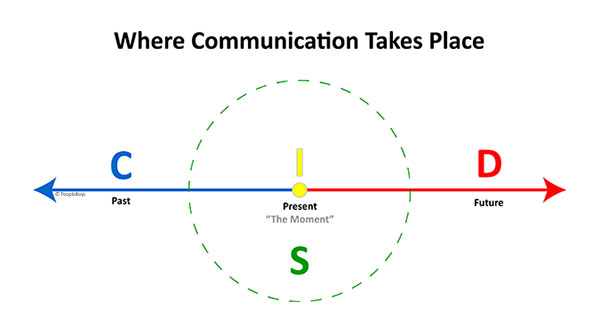“Stay in your lane.”
It’s a phrase many of us have heard, sometimes in humor, other times as a sharp dismissal. But what does it really mean?
Is it a warning that you’ve crossed into someone else’s territory? A not-so-subtle way of saying, “Back off, you don’t belong here”? If you’ve ever found yourself on the receiving end of this phrase after offering insight, advice, or support, you know how jarring it can feel. One moment you’re trying to be helpful, the next you’re wondering if you’ve made a wrong turn on some invisible highway.
Before you exit the conversation or make a hard U-turn, consider this: That moment might hold more opportunity than rejection. In fact, it might be exactly where your role as a coach truly begins.
Let’s explore why the idea of “staying in your lane” might be due for a rethink, and how the DISC behavioral system can guide coaches to lead confidently in any space.
The Origins of “Stay in Your Lane” Thinking
Many coaches begin with a niche: health and wellness, executive leadership, small business, career transitions, relationships. This is often shaped by personal experience, academic background, or professional expertise. There’s real value in that. Specialization gives you credibility and direction, especially in the early stages of your coaching journey.
But it also creates a common limitation: the belief that you’re only qualified to support people within that specific area. Anything beyond your niche feels off-limits, or out of your lane.
When clients or peers reinforce that belief with comments like “You don’t understand,” “You’re not in this field,” or “Stay in your lane,” it’s easy to back down. But doing so might mean missing a powerful coaching opportunity.
Let’s challenge this mindset with three key insights.
Coaching Isn’t Defined by Industry
The International Coaching Federation (ICF) defines coaching as “a thought-provoking and creative process that inspires clients to maximize their personal and professional potential.”
Notice what’s not included in that definition? Any mention of specific industries or job titles.
Coaching isn’t just for business executives or elite performers. It isn’t limited to therapy rooms, corporate boardrooms, or athletic fields. Coaching is a skill rooted in human interaction, one that can be applied in nearly any setting—at work, at home, or anywhere people need support and direction.
What makes a coach effective is not their industry expertise. It’s their ability to listen, ask thoughtful questions, challenge assumptions, and help people uncover their own solutions. Coaches who are trained in behavioral science, especially those certified in DISC or behavioral analysis, bring a unique advantage. They are equipped to see patterns in behavior that others may miss.
When you focus on behavior rather than profession, coaching becomes more versatile and more impactful.
DISC Is a Universal Language for Coaches
DISC is one of the most widely used behavioral tools in the world. Its simplicity and accuracy make it effective across cultures, roles, and industries.
For coaches, DISC is more than just an assessment. It’s a lens for understanding human behavior—how people process information, make decisions, and respond to stress or pressure.
Imagine being able to identify whether someone is naturally decisive and goal-oriented (D), social and enthusiastic (I), steady and supportive (S), or analytical and cautious (C). Then, imagine adapting your coaching approach to match that person’s communication needs and preferences.
DISC helps coaches:
-
Understand how others are wired
-
Identify behavioral blind spots
-
Improve communication with clients
-
Strengthen relationships and trust
-
Create customized coaching strategies
Because DISC is not tied to a specific field or profession, it gives you the flexibility to serve a wide variety of clients. Whether you’re working with a team leader, a parent, a teacher, or an entrepreneur, the insights from DISC can help them grow and communicate more effectively.
Coaching Works Everywhere, But Timing Matters
While coaching skills are universally helpful, not every situation is the right moment for a coaching conversation. Timing, context, and a person’s emotional state all play a role in whether they are open to feedback or self-reflection.
When someone tells you to “stay in your lane,” it might not be a judgment on your expertise. It could be a signal that they’re overwhelmed, stressed, or feeling vulnerable. They may not be ready to explore the issue you’re raising.
This is where your DISC knowledge becomes especially valuable. People express stress differently depending on their behavioral style:
-
High D styles may become controlling or impatient
-
High I styles may deflect or talk around the issue
-
High S styles may retreat or avoid confrontation
-
High C styles may become hyper-focused on details or overly critical
If you can identify these patterns, you can respond with empathy instead of frustration. Instead of pushing forward, consider stepping back to listen and observe. Ask yourself:
-
What might this person be experiencing right now?
-
Are they in a space where coaching will be helpful?
-
Is this a conversation for another time?
Sometimes, the best coaching move is simply to wait. Let the person know you’re there, and revisit the topic when the time feels right. That still counts as coaching. It’s just done with patience and emotional intelligence.
Coaching Is a Lane, And It’s Wide
Coaching isn’t a narrow lane with tight restrictions. It’s a wide road, with space for adaptability, curiosity, and growth. The idea that you must stay in one niche or area forever is limiting, and often unnecessary.
When someone puts up a “Do Not Enter” sign in a conversation, it doesn’t always mean you’ve done something wrong. It might be a cue to pause, build more trust, or shift your approach. These moments often hold more insight than we realize.
The best coaches know how to read those cues, stay flexible, and keep moving forward with their client’s needs in mind.
If you’re working with someone and their challenge doesn’t match your core focus, that’s not a failure. It might be a chance to refer them to someone else. Or it might lead you to expand your coaching practice into a new area altogether. Either way, you’re still honoring your role as a guide and support system.
Final Thoughts: Rethink the Limits of “Your Lane”
Whether you’re new to coaching or have years of experience, remember this: You’re not limited by your niche. With the right tools and mindset, your coaching can reach farther than you think.
DISC helps you connect with people as they are, not as you expect them to be. It equips you to navigate stress, resistance, and communication breakdowns with clarity. And most importantly, it reinforces the idea that coaching is about people, not just professions.
So next time you hear “stay in your lane,” take a breath. Consider what that person might be going through. Use it as an opportunity to build trust, reflect on timing, and remember that coaching with intention, empathy, and insight is always the right path forward.
Interested in expanding your coaching practice with DISC?
Most coaches often take the first step by becoming DISC certified. Explore our DISC certification to get started or check out our tools designed to help you connect, lead, and coach more effectively.





